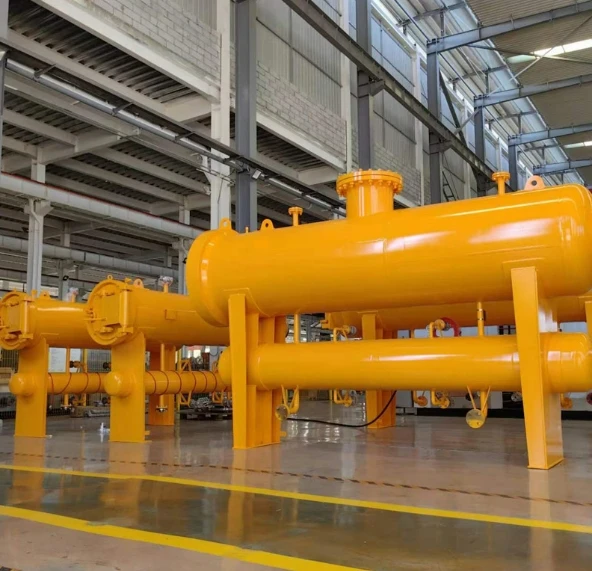
Oct . 01, 2024 06:42
Back to list
Creating a Filtering System Using a Separator for Improved Data Management
Understanding the Importance of Filter Separators in Industrial Applications
In various industrial processes, the need for effective separation techniques has become increasingly critical. Among these techniques, filter separators play a pivotal role in ensuring operational efficiency across numerous sectors, including oil and gas, chemical manufacturing, and wastewater treatment. This article delves into the functions, benefits, and applications of filter separators, highlighting their significance in modern industrial operations.
What is a Filter Separator?
A filter separator is an industrial apparatus designed to remove solid contaminants and separate liquids from gases. By combining filtration and separation processes within a single unit, filter separators help maintain the purity of gases and liquids, ensuring that downstream equipment operates efficiently and effectively. These systems are commonly employed in environments where gas streams contain particulates, water, or other contaminants that could compromise product quality or equipment integrity.
How Filter Separators Work
The operation of filter separators revolves around two fundamental principles filtration and gravitational separation. Initially, the gas stream containing contaminants enters the filter separator, where larger solid particles are trapped by a filter medium. The filter fabric or mesh intercepts these particulates, preventing them from continuing downstream.
Following the filtration process, the gas stream experience a change in velocity and pressure, typically within a cylindrical separator chamber. This change facilitates the gravitational separation of any remaining liquid or heavier contaminants. As the gases ascend, any liquids—such as water or hydrocarbon-based fluids—tend to settle at the bottom of the container due to their higher density. This allows for a clean, dry gas to exit the separator, while the collected liquids can be drained away for further processing or disposal.
Benefits of Using Filter Separators
1. Enhanced Equipment Protection One of the primary benefits of implementing filter separators is their ability to protect downstream equipment from damage caused by solid particulates and liquid contamination. By ensuring cleaner gas streams, these separators help extend the lifespan of compressors, turbines, and other machinery.
2. Improved Product Quality In many processes, the quality of the final product is paramount. Undesired contaminants can alter the properties of the output, potentially leading to costly rework or rejection of products. Filter separators contribute to maintaining quality standards by effectively removing impurities, thus ensuring that only pure gases are processed.
filter separator

3. Reduced Operating Costs Although the initial investment in filter separators may be considerable, the long-term savings can be significant. Enhanced efficiency and reduced downtime lead to lower maintenance costs and improved overall productivity.
4. Environmental Compliance In an era of increasing regulatory scrutiny regarding emissions and waste management, filter separators play a critical role in ensuring compliance with environmental standards. By minimizing the release of contaminants into the atmosphere, these systems contribute to a cleaner and safer environment.
Applications in Various Industries
Filter separators find application across a myriad of industries
- Oil and Gas In the oil and gas sector, filter separators are essential for separating water and solids from crude oil and natural gas. This ensures that products meet industry specifications and minimizes the risk of pipeline corrosion.
- Chemical Manufacturing In the production of chemicals, filter separators are utilized to ensure the purity of feedstock, which is critical for achieving the desired chemical reactions and end products.
- Wastewater Treatment In wastewater treatment plants, filter separators help remove solids and other contaminants from effluent streams, ensuring that treated water meets regulatory standards before being released back to the environment.
Conclusion
Filter separators are indispensable tools in modern industrial processes. They not only enhance equipment efficiency and extend service life but also significantly improve product quality and adhere to environmental regulations. As industries continue to evolve and face new challenges, the role of filter separators will undoubtedly grow, highlighting their importance in achieving operational excellence and sustainability.
Latest news
-
Safety Valve Spring-Loaded Design Overpressure ProtectionNewsJul.25,2025
-
Precision Voltage Regulator AC5 Accuracy Grade PerformanceNewsJul.25,2025
-
Natural Gas Pressure Regulating Skid Industrial Pipeline ApplicationsNewsJul.25,2025
-
Natural Gas Filter Stainless Steel Mesh Element DesignNewsJul.25,2025
-
Gas Pressure Regulator Valve Direct-Acting Spring-Loaded DesignNewsJul.25,2025
-
Decompression Equipment Multi-Stage Heat Exchange System DesignNewsJul.25,2025

